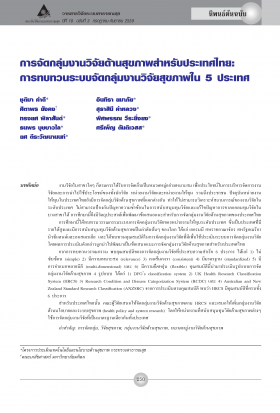This website uses cookies so that we can provide you with the best user experience possible. Cookie information is stored in your browser and performs functions such as recognising you when you return to our website and helping our team to understand which sections of the website you find most interesting and useful.
การจัดกลุ่มงานวิจัยด้านสุขภาพสำหรับประเทศไทย: การทบทวนระบบจัดกลุ่มงานวิจัยสุขภาพใน 5 ประเทศ

รายละเอียดเพิ่มเติม
ชุติมา คำดี
อินทิรา ยมาภัย
ศิตาพร ยังคง
สุธาสินี คำหลวง
ทรงยศ พิลาสันต์
พิศพรรณ วีระยิ่งยง
ธนพร บุษบาวไล
ศรีเพ็ญ ตันติเวสส
ยศ ตีระวัฒนานนท์
บทคัดย่อ:
งานวิจัยในสาขาใดๆ ก็ตามควรได้รับการจัดเก็บเป็นหมวดหมู่อย่างเหมาะสม เพื่อประโยชน์ในการบริหารจัดการงานวิจัยและการนำไปใช้ประโยชน์ของทั้งนักวิจัย หน่วยงานวิจัยและหน่วยงานให้ทุน รวมถึงประชาชน ปัจจุบันหน่วยงานให้ทุนในประเทศไทยยังมีการจัดกลุ่มวิจัยด้านสุขภาพที่แตกต่างกัน ทำให้ไม่สามารถวิเคราะห์สถานการณ์ของงานวิจัยในระดับประเทศ ไม่สามารถป้องกันปัญหาความซ้ำซ้อนในการสนับสนุนทุนวิจัยและไม่สามารถแก้ไขปัญหาการขาดแคลนทุนวิจัยในบางสาขาได้ การศึกษานี้จึงมีวัตถุประสงค์เพื่อพัฒนาข้อเสนอแนะสำหรับการจัดกลุ่มงานวิจัยด้านสุขภาพของประเทศไทย การศึกษานี้ได้ทบทวนวรรณกรรมระบบการจัดกลุ่มงานวิจัยของหน่วยงานให้ทุนระดับประเทศ ซึ่งเป็นประเทศที่มีรายได้สูงและมีการสนับสนุนทุนวิจัยด้านสุขภาพเป็นลำดับต้นๆ ของโลก ได้แก่ เยอรมนี สหราชอาณาจักร สหรัฐอเมริกา นิวซีแลนด์และออสเตรเลีย และได้ทบทวนคุณสมบัติในการจัดกลุ่มงานวิจัยที่ดีเพื่อใช้ประเมินระบบการจัดกลุ่มงานวิจัย โดยผลการประเมินดังกล่าวนำไปพัฒนาเป็นข้อเสนอแนะการจัดกลุ่มงานวิจัยด้านสุขภาพสำหรับประเทศไทย จากการทบทวนวรรณกรรม พบคุณสมบัติของการจัดกลุ่มงานวิจัยที่ประสบความสำเร็จ 6 ประการ ได้แก่ 1) ไม่ซับซ้อน (simple) 2) มีความเหมาะสม (relevance) 3) คงเส้นคงวา (consistent) 4) มีมาตรฐาน (standardized) 5) มีการจำแนกหลายมิติ(multi-dimensional) และ 6) มีความยืดหยุ่น (flexible) คุณสมบัตินี้นำมาประเมินรูปแบบการจัดกลุ่มงานวิจัยด้านสุขภาพ 4 รูปแบบ ได้แก่ 1) DFG’s classification system 2) UK Health Research Classification System (HRCS) 3) Research Condition and Disease Categorization System (RCDC) และ 4) Australian and New Zealand Standard Research Classification (ANZSRC) และ จากการประเมินตามคุณสมบัติ พบว่า HRCS มีคุณสมบัติที่ครบทั้ง 6 ประการ สำหรับประเทศไทยนั้น คณะผู้วิจัยเสนอให้จัดกลุ่มงานวิจัยด้านสุขภาพตาม HRCS และเสนอให้เพิ่มกลุ่มงานวิจัยด้านนโยบายและระบบสุขภาพ (health policy and system research) ด้วย โดยให้หน่วยงานที่สนับสนุนทุนวิจัยด้านสุขภาพต่างๆ ใช้การจัดกลุ่มงานวิจัยที่เป็นมาตรฐานเดียวกันทั้งประเทศ
Abstract:
Appropriate standardized research grouping is important for research management of researchers, research institutes and funding agencies. Health research funding agencies in Thailand have different management policies and system regarding allocation of funds. As a result, there exists a gap in the information on which areas of research are progressive. Grouping research projects properly, in the same standard with other funding agencies, will not only strengthen the funding strategy of each agency, but also help avoid the duplication of research funding in one area with less funding in another. This study aimed to review the health research classifications in high-income countries in order to have a basis for recommendations to Thai health research. Literature review was conducted to find the key characteristics of successful research classification systems. Five countries were selected for review of best research classification. These countries include: Australia, Germany, New Zealand, United Kingdom and United States. The study found the following six principles of successful research classification systems: 1) simplicity 2) relevance 3) consistency 4) standard 5) multi-dimensionality and 6) flexibility. From assessing the research classifications in five countries, we concluded that the Health Research Classification System (HRCS) of the UK Clinical Research Collaboration. (UKCRC) met all six principles. Therefore, based on this study, we recommended the adoption of the HRCS classification systems. Furthermore, we recommended adding the health policy and system research as a new classification in order to aid with policy development and implementation in Thailand. In conclusion, health research funding agencies should apply the same classification standards.
Full Text: http://kb.hsri.or.th/dspace/handle/11228/4556?locale-attribute=th




